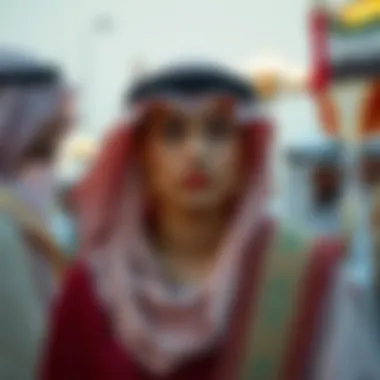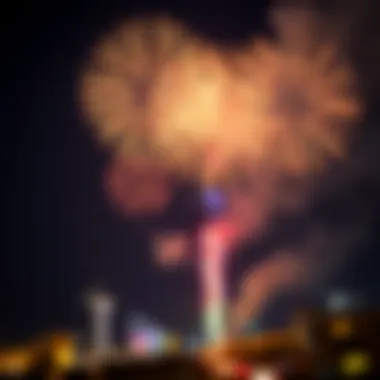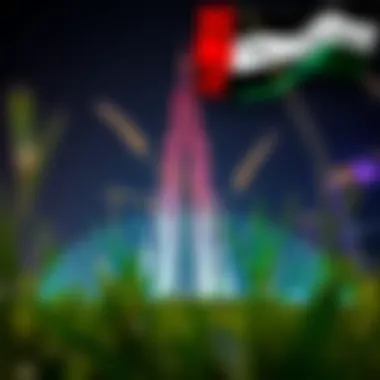Exploring the Significance of UAE National Day


Intro
The National Day of the United Arab Emirates represents more than just a date on the calendar; it serves as a powerful reminder of the nation’s storied journey towards unity and identity. Celebrated on December 2nd each year, this day marks the anniversary of the UAE’s formation in 1971, when seven emirates came together to share a common destiny. From the bustling markets of Dubai to the serene deserts of Abu Dhabi, various regions partake in joy and reverence, showcasing the rich tapestry of culture and tradition that characterizes this unique nation.
As we explore the significance of this occasion, we uncover layers of history, emotion, and patriotism that resonate deeply within the hearts of the Emirati people. This exploration leads us through vibrant celebrations, traditional customs, and the evolution of national pride, ultimately painting a vivid picture of life in the UAE.
In diving into how these celebrations reflect both historical insights and contemporary realities, we appreciate not only the events of the day but also the unity that they foster among citizens and residents alike. Let's delve into the regional flavors of these festivities and explore how they contribute to a sense of belonging and identity.
Historical Context of the National Day
The historical context of the National Day is not merely a backdrop; it’s the heartbeat of a nation’s identity. The story of the United Arab Emirates' formation is rich with ambition, collaboration, and a deep yearning for unity. This day, celebrated every 2nd of December, marks the anniversary of the federation of the seven emirates, which were once individual entities.
Formation of the United Arab Emirates
In the early 1970s, the region we know today as the United Arab Emirates was undergoing significant transitions. These emirates—Abu Dhabi, Dubai, Sharjah, Ajman, Umm Al-Quwain, Fujairah, and Ras Al Khaimah—were separate states, each with its own governance. The discovery of oil brought prosperity but also highlighted the need for collaboration. Sheikh Zayed bin Sultan Al Nahyan, the visionary leader of Abu Dhabi, played a pivotal role in bringing these emirates together under one umbrella. He believed that only through unity could they achieve the stability and prosperity needed to thrive.
On December 2, 1971, the first six emirates signed the unification agreement, and shortly thereafter, Ras Al Khaimah joined in 1972, solidifying the formation of the United Arab Emirates.
This collaboration was significant not only politically but also economically and culturally, setting the tone for a new era marked by growth and innovation.
Key Figures in UAE's Independence
The emergence of the UAE as a unified nation was not happenstance; it was brought about by key figures who understood the stakes. Sheikh Zayed is often rightly celebrated as the father of the nation, but he was not alone. Alongside him were other vital leaders like Sheikh Rashid bin Saeed Al Maktoum of Dubai and Sheikh Khalid bin Mohammed Al Qasimi of Sharjah, among others. These figures not only contributed strategically to the federation's foundation but also fostered a shared vision, promoting dialogue and cooperation amongst the emirates.
**"A nation's greatness is measured by how it treats its weakest members."
- Sheikh Zayed bin Sultan Al Nahyan**
Their legacies are interwoven into the fabric of the UAE’s identity today. Their decisions were regularly informed by foresight, prioritizing not just immediate gains but long-term harmony and prosperity. This mirrors the collaborative spirit found within the Emirates today, whether in business or cultural exchanges.
Milestones Leading Up to National Day
Several milestones mark the journey to National Day, each significant in shaping the UAE’s narrative. From the 1968 British decision to withdraw from its treaties in the Gulf, which opened the door for the emirates to explore self-determination, to the formation of the UAE itself, these events laid the groundwork for a united society.
- 1968: The British announcement led to increased discussions among the emirates about unity.
- 1971: Signing of the Union Agreement on December 2.
- 1972: The ascension of Ras Al Khaimah, completing the full formation of the UAE.
These milestones are not just historical markers; they signify the resolve of leaders and citizens alike to pursue a common goal, serving as a reminder of what can be achieved through unity and determination.
Cultural Significance
The cultural significance of the National Day of the United Arab Emirates is both profound and multifaceted. This day, celebrated on December 2nd, marks the birth of a unified nation in 1971, but it transcends mere historical commemoration. It's a moment that fosters a deep sense of national identity and collective pride among Emiratis. The confluence of tradition and modernity on this day highlights the evolution of the country while honoring its rich heritage.
National Identity and Pride
At its core, National Day is a celebration of national identity—a day when Emiratis from diverse backgrounds come together. This gathering fosters a sentiment of unity, showcasing that, despite their varied roots, all citizens share a common bond. The stories told through celebrations—be it the traditional performances or modern expressions of art—serve as reminders of the values and history that shape their identity. The nostalgia for the origins of the nation, marked by the trials and triumphs of its people, instills a sense of pride that is palpable during the festivities.
Symbolism of the UAE Flag


The UAE flag, unfurling against the azure sky, is not just a piece of fabric; it is a powerful symbol of the nation’s heritage and aspirations. Comprising red, green, white, and black stripes, each color carries its own meaning—red signifies bravery, green represents hope, white reflects peace, and black embodies the strength and resilience of the people. On National Day, parades and public displays proudly wave this flag, reinforcing the spirit of unity and the shared vision for prosperity among Emiratis. The sight of thousands of individuals waving this flag together resonates deeply, reaffirming their commitment to the nation's future.
Recitation of the National Anthem
The recitation of the national anthem, "Ishy Biladi," further cements the day’s significance. It is more than just a song; it is an emotional expression of loyalty and attachment to the homeland. The participants, young and old, often sing it with shimmering eyes, reflecting a strong emotional connection to their roots and aspirations. The anthem encapsulates the essence of resilience and hope, binding the citizens together in collective remembrance of their journey towards nationhood and their vision for a brighter tomorrow.
"A nation’s culture resides in the hearts and in the soul of its people."
— Mahatma Gandhi
In this context, the National Day of the UAE serves as a significant observance that resonates beyond its immediate celebrations. It nurtures a sense of belonging while redefining what it means to be an Emirati in a rapidly evolving world.
For more information on the cultural significance of the UAE, you can visit Wikipedia - United Arab Emirates or read more about its history on Britannica.
Overall, the cultural significance of the National Day is a reflection of a nation that embraces its past while looking forward to its future.
Celebrations Across the Emirates
The National Day of the United Arab Emirates represents more than just a date on the calendar; it stands as a vibrant showcase of the nation’s spirit and unity. Celebrations across the Emirates play a crucial role in stitching the cultural fabric that binds the diverse population together. These festivities not only honor the historical significance of the day, but they also foster a sense of belonging among citizens and residents alike, making it an essential topic within this exploration.
Traditional Festivities
As the sun rises on December 2nd, the sound of music and laughter echoes throughout the streets of the UAE. Traditional festivities are integral to the celebrations, celebrating the rich heritage that has shaped the nation. Each emirate offers unique cultural events that reflect its individual identity yet are woven together through universal values of hospitality and community.
For instance, in Abu Dhabi, the sight of traditional dances, such as the Ayallah, captivates onlookers. Waving swords and rhythmic chanting echo the ancient Bedouin lifestyle and unite people in a joyous embrace of their history. Meanwhile, in Dubai, local markets bustle with the aroma of traditional dishes like machboos and shawarma. These culinary experiences not only satisfy hunger but also nourish the soul by connecting people to their land’s roots.
"Cultural expressions through music, dance, and food are the heartbeat of our nation, reminding us of who we are and where we come from."
— Emarati Poet
Fireworks and Light Displays
Another remarkable aspect of the celebrations is the breathtaking fireworks and light displays that light up the night sky. Renowned for setting the bar high, the UAE puts on a dazzling spectacle that captures the attention of the world. Cities like Dubai and Abu Dhabi become canvases painted in color as fireworks burst open, showering glimmers of light as crowds gather below in rapturous awe.
The iconic Burj Khalifa serves as a backdrop for one of the most spectacular shows, where fireworks rise in unison with the national anthem playing in the background. This harmony between sound and sight creates an electric atmosphere that resonates deeply with residents and visitors alike. Such displays are not just about beauty either; they symbolize hope, progress, and unity, celebrating the achievements of the nation.
Parades and Public Gatherings
Parades and public gatherings are a sight to behold during this festive occasion. Throngs of people—families, friends, and tourists—come together to celebrate, creating an infectious atmosphere filled with laughter and camaraderie. In Dubai, the streets become a parade route where elaborate floats, showcasing the UAE's rich heritage and modern achievements, draw the eyes of thousands.
Children and adults alike wear national colors, waving flags proudly and cheering on various performative acts that celebrate the nation's history. Public squares and parks transform into hubs of activity, providing entertainment, food stalls, and cultural exhibitions. These gatherings serve an essential purpose—they represent unity and dialogue among the Emirati people and expats, emphasizing the inclusive nature of the celebrations.
In summary, the different celebrations across the Emirates signify the collective identity of the UAE. Traditional festivities, awe-inspiring fireworks, and lively parades come together, forming a rich tapestry that narrates the UAE's story while fostering a sense of national pride and community. As countries around the world observe their days of independence, the UAE stands out with its unique blend of modernity and tradition, a true reflection of its ever-evolving identity.
Modern Observances
The Modern Observances of the National Day of the UAE serve as a vital reflection of the country's journey and identity. This day is not just a mere holiday on the calendar; it's a living embodiment of a nation’s spirit, showcasing both past triumphs and forward-looking aspirations. Understanding these observances provides insight into how the Emiratis commemorate their unity and heritage.
Government Initiatives and Events


In the lead-up to National Day, the UAE government rolls out various initiatives aimed at fostering national pride and unity. Events are meticulously planned across all emirates to ensure maximum participation. The celebrations often include official ceremonies, cultural exhibitions, and various artistic performances.
In recent years, initiatives like the Year of Tolerance and Year of Innovation have influenced the way this day is marked, emphasizing themes of inclusivity and creativity. For instance, in Abu Dhabi, the tradition of lighting up notable landmarks with the colors of the UAE flag creates an invigorating atmosphere, catering to both locals and tourists.
The government's commitments offer a glimpse into the UAE’s efforts to keep its rich history alive while steering the nation towards innovation and modernization through these events.
Community Engagement Programs
Local communities play a significant role in the National Day festivities. Grassroots programs that involve schools, neighborhoods, and community centers reflect a concerted effort to engage citizens of all ages. Activities range from art competitions focused on UAE themes to public forums that encourage dialogue about the country’s future.
These programs highlight the importance of grassroots participation in national events. They create connections among residents, emphasizing the values of togetherness and collective identity. Additionally, engaging youth through sports events and workshops helps instill a sense of responsibility and belonging, ensuring that the upcoming generations carry forward their heritage.
Role of Media in Celebrations
The media landscape in the UAE is vibrant and plays a crucial role in broadcasting the National Day celebrations. Television networks, social media platforms, and news outlets join forces to document various events live, allowing those unable to attend in person to participate virtually.
Notably, hashtags like #UAE National Day often trend on social media, generating conversations about the significance of the day and sharing personal stories.
The narrative shaped by the media not only highlights the festivities but often delves deeper into the historical and cultural context of the UAE. Through rich storytelling, interviews with key figures, and coverage of community events, media serves as a bridge connecting the present celebrations to the rich cultural tapestry of the UAE’s past.
Impact on National Unity
The National Day of the United Arab Emirates serves as a pivotal moment for reflecting on national unity. The day is not just a celebration of independence; it's a manifestation of the cohesive identity that binds the diverse emirates together. From the sandy shores of Abu Dhabi to the bustling markets of Dubai, the communal spirit is ignited as citizens and expatriates alike come together under the vibrant flag of the UAE.
Fostering National Cohesion
National cohesion is a vital aspect of the UAE's story. The UAE's formation in 1971 marked the beginning of a remarkable journey towards forging a unified identity amid a backdrop of diverse cultures and languages. This day offers a platform to foster relationships between different communities. The gatherings and events organized across the emirates serve to remind everyone of their shared goals and aspirations.
One could say that National Day acts like the glue that holds the diverse fabric of society together. By highlighting shared stories and achievements, the celebrations draw threads of commonality between people. Through events like cultural exhibitions and unity-focused speeches, Emiratis see themselves not just as individuals from separate emirates but as integral parts of a greater whole.
Inclusivity and Diversity in Celebrations
The hallmark of National Day observance is inclusivity. Multitudes representing various backgrounds dance and sing, their differences appreciated rather than shunned. In this melting pot of cultures, everyone feels welcome, making the celebrations a true reflection of the modern UAE. There’s often a notable participation of expatriate communities who have become integral to the fabric of Emirati society.
Events in parks or city squares feature performances from multicultural bands and traditional dances alongside contemporary music. This symphony of sounds showcases the nation's diversity, illustrating that unity does not necessitate homogeneity. Participating in National Day provides an opportunity for expatriates to express their appreciation for the country that has welcomed them.
“A tapestry is beautiful because each thread contributes to the whole. The UAE’s celebrations are no different.”
Youth Participation and Representation
One of the most encouraging aspects of National Day is the active participation of youth. The younger generation plays a crucial role in shaping national identity, embodying the spirit of progress while keeping traditions alive. Schools and universities take part in the celebrations with various events designed to engage young minds in their cultural heritage.
From art exhibitions that depict the UAE's history to poetry slams that express modern Emirati sentiments, youth are at the forefront of creativity. Their involvement not only enriches the celebrations but also ensures a new generation is invested in maintaining national pride. Moreover, these celebrations serve as a learning experience, instilling values of unity, respect, and cooperation among the youth—a necessity in an increasingly globalized world.
Through these multifaceted endeavors, the National Day of the UAE strengthens the fabric of the nation, inviting every citizen to partake in legitimate celebrations of their shared history and collective future. The essence is simple: the day is more than just a date; it’s an enduring testament to what unity can accomplish.


International Relevance
In a rapidly globalizing world, the National Day of the United Arab Emirates (UAE) serves as more than just a local celebration. It is a lens through which one can observe the UAE's emergent role on the global stage. The observance of this day brings into focus the UAE's diplomatic initiatives, cultural exchanges, and its overall positioning in the international community. The relevance of this is not solely for Emiratis but also for foreign investors, businesses, and various sectors looking to engage with the UAE.
UAE's Global Positioning
The UAE has carved out a significant place in the global arena. Whether it's in trade, tourism, or diplomacy, the nation's strategic position between East and West makes it a natural hub for international relations. Cities like Dubai and Abu Dhabi have become synonymous with luxury, innovation, and multiculturalism. The National Day highlights this positioning by showcasing how the UAE has transformed from a collection of tribal territories into a powerful state with a robust economy.
Key Aspects of UAE's Global Standing:
- Economic Growth: The UAE boasts one of the most diverse economies in the Middle East, attracting foreign direct investment and fostering entrepreneurship.
- Tourism Magnet: Events and festivities on National Day create tourism spikes, showcasing the UAE as a vibrant destination for visitors.
- Cultural Diplomacy: The UAE actively promotes its culture worldwide, engaging in soft power tactics to enhance its global image.
Diplomatic Initiatives
The UAE’s diplomatic initiatives are crucial in establishing its presence on the global map. The nation has consistently sought to bolster its relationships through various means, such as participation in international organizations and hosting major events. This commitment to diplomacy often shines the brightest during National Day.
"The way a nation celebrates its independence can often provide insights into its diplomatic priorities."
For instance, UAE leadership frequently emphasizes the importance of collaborative agreements during National Day speeches. This includes participation in forums like the United Nations and the Gulf Cooperation Council. Through these platforms, the UAE advocates for peace, stability, and shared economic prosperity in the region and beyond.
Cultural Exchanges with Other Nations
Cultural exchanges elevate the significance of the National Day as they underscore the UAE’s commitment to fostering global goodwill. The UAE has historically been the melting pot of cultures, and its National Day celebrations are a robust testament to this identity. By opening doors to various cultural festivities, the UAE showcases its rich heritage while also embracing diversity.
Notable Cultural Exchange Programs Include:
- Arts and Heritage Festivals: Initiatives like the Abu Dhabi Festival invite artists and performers from various countries, encouraging cultural dialogue.
- Educational Partnerships: Schools and universities in the UAE often collaborate with institutions abroad, promoting educational opportunities that prepare Emirati youth for a global workforce.
- International Workshops: Many centers in the UAE host workshops focusing on various aspects of art, music, and cuisine from different cultures, fostering interaction between locals and expatriates.
The interplay of these initiatives impacts not just the UAE but also builds bridges with other nations, reinforcing the idea that National Day is not just an Emirati pride celebration but also an invitation to the world to join in their journey.
Reflection and Future Outlook
As the sands of time shift, it becomes ever more vital to reflect on the past and gaze towards the horizon of the future, especially in a nation as dynamic as the United Arab Emirates. The National Day serves not just as a moment of celebration, but as a cornerstone for collective reflection about how the UAE has shaped its identity and how it’s poised to navigate future challenges while sustaining its rich heritage.
Evolving Traditions
Traditions in the UAE are not static; they evolve as the people adapt to a fast-changing world. The National Day, once a simple celebration of independence, has morphed into a grand spectacle that blends ancient customs with modern practices. For instance, traditional Emirati music and dance are still prevalent, but they are often combined with contemporary arts, leading to a unique cultural fusion.
Importantly, there’s a focus on preserving traditional folklores while also introducing contemporary art forms. This duality reflects a society that values its heritage while embracing innovation. Events like the Al Ain Oasis Festival showcase how traditional storytelling coexists alongside modern dance troupes, celebrating Emirati culture in a manner that appeals to both locals and tourists alike.
Sustaining National Heritage
Sustaining national heritage is crucial for maintaining the UAE’s identity. Programs initiated by the Ministry of Culture and Knowledge Development aim to revitalize interest in traditional crafts, language, and customs. These efforts recognize that heritage is not merely an academic exercise; it is a living part of daily life. With the advent of UAE Heritage Day, various schools and organizations take part in activities designed to teach the youth about their roots, nurturing a sense of pride and belonging.
Furthermore, digital platforms play an instrumental role in this sustainability process. Online archives and social media campaigns highlight traditional practices, making them accessible to younger generations. This shifts how heritage and culture are experienced, moving from a past-oriented view to a vibrant, remodeled presence in today’s society.
Vision for the Future of the UAE
The vision for the future of the UAE, as articulated in the UAE Vision 2021 and beyond, focuses on creating a knowledge-based economy where cultural identity is preserved while embracing innovation. With ambitious goals set for economic diversification and sustainability, the UAE is gearing up to become a beacon for others.
This vision fosters a strong sense of national unity, which is paramount as the nation grows. The investment in renewable energy and tourism alongside a conscientious regard for traditions means that the UAE of tomorrow aims to be both modern and deeply rooted in its cultural identity. Challenges such as climate change and global economic shifts will certainly arise, but the resilience demonstrated by the UAE’s leadership ensures that its future is bright.







